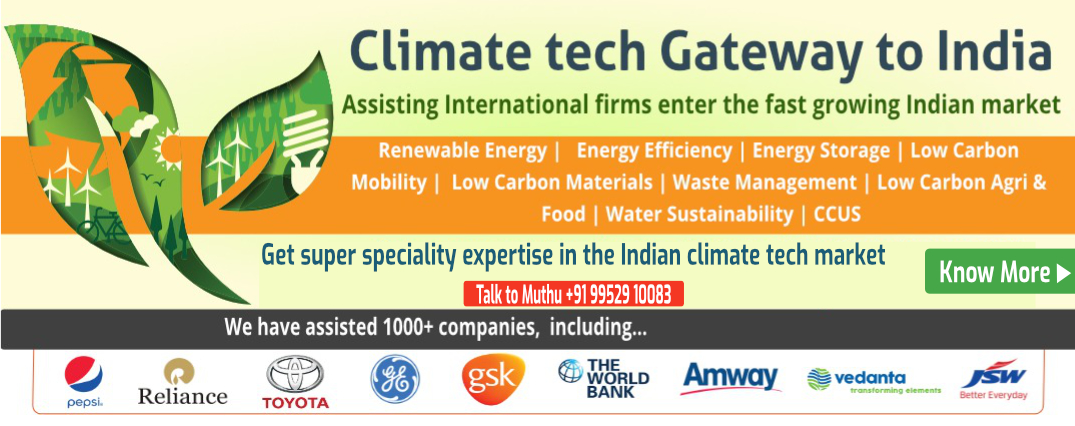This post is a part of Climate G2I Intelligence series from Energy Alternatives India (EAI), India’s leading climate-tech consulting firm.
G2I stands for Gateway 2 India, and provides comprehensive market intelligence and go-to market assistance for International firms entering the Indian climate-tech market. More about Climate G2I from here
India’s electric vehicle (EV) sector is witnessing a surge in investor confidence, as evidenced by Switzerland-based responsability’s recent commitment to invest up to $25 million in BluSmart, a leading electric vehicle ride-hailing and charging infrastructure provider.
BluSmart, the recipient of responsability’s investment, is a pioneer in India’s electric vehicle ride-hailing space. The company has established itself as a leader in the market, boasting over 4,000 charging stations and 6,000 electric vehicles in its fleet. BluSmart’s impressive growth trajectory, exceeding 100% annually, is a testament to the rising demand for electric mobility solutions in India.
Responsability’s decision to invest in BluSmart is a strategic move that aligns with their commitment to promoting sustainable investments. By supporting BluSmart’s expansion plans, responsability is contributing to the development of India’s EV ecosystem, while also generating potential financial returns.
Net Zero by Narsi
Insights and interactions on climate action by Narasimhan Santhanam, Director - EAI
View full playlistIndia’s EV market is experiencing a period of rapid transformation. A confluence of factors, including supportive government policies, rising fuel prices, and a growing awareness of environmental concerns, are driving the adoption of electric vehicles. This presents significant opportunities for businesses seeking to capitalize on the demand for cleaner and more sustainable modes of transportation.
The Indian EV ecosystem encompasses a diverse range of stakeholders, including original equipment manufacturers (OEMs) like Tata Motors and Mahindra, component suppliers, battery manufacturers, charging infrastructure providers, and government agencies. The sector is witnessing a surge in partnerships and alliances, with both domestic and international companies collaborating to develop and commercialize EV technologies.
While the Indian EV market holds immense promise, it also faces several challenges. The relatively high cost of EVs, limited charging infrastructure, and a lack of standardization pose hurdles to widespread adoption. However, the government’s proactive measures, such as its Phased Manufacturing Programme (PMP) and Production Linked Incentive (PLI) scheme, are aimed at increasing the indigenization of EV components and driving down costs.
India’s ambitious EV targets, coupled with favorable policies like tax breaks, subsidies, and investments in charging infrastructure, are creating a conducive environment for growth in the sector. The Indian electric vehicle market is projected to grow from USD 3.21 billion in 2022 to USD 113.99 billion in 2029, exhibiting a remarkable CAGR of 66.52%. This growth trajectory presents lucrative opportunities for investors, manufacturers, and businesses across the EV value chain.
The sector is also witnessing a surge in partnerships and alliances, with both domestic and international companies collaborating to drive innovation and growth. Examples include International partnerships between ABB and CESL for fast-charging stations, Fortum and Jio-bp for public charging networks, and Sun Mobility and Bosch for advanced battery swapping technology. These collaborations highlight the collaborative spirit driving the Indian EV sector forward, as they join forces to overcome challenges and unlock the full potential of this rapidly evolving market.
To fully realize the potential of India’s EV sector, a collaborative effort is required. Addressing challenges like high battery costs, expanding charging infrastructure, and raising consumer awareness are crucial steps towards achieving widespread adoption. As India transitions towards a greener transportation future, the electric vehicle sector will undoubtedly play a pivotal role.
This post is a part of Climate G2I Intelligence series from Energy Alternatives India (EAI), India’s leading climate-tech consulting firm.
G2I stands for Gateway 2 India, and provides comprehensive market intelligence and go-to market assistance for International firms entering the Indian climate-tech market. More about Climate G2I from here







 Our specialty focus areas include
Our specialty focus areas include




